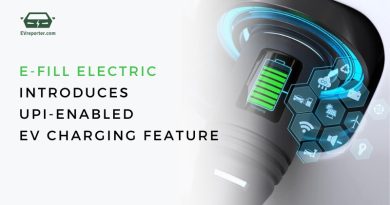How LoadExx operates its EV fleet for B2B and B2C deliveries | Case Study
EVreporter recently published a report on ‘Business models adopted by EV Fleet Companies in India’. The report can be accessed here. This article is an excerpt from the report.
LoadExx is a Kolkata based EV fleet company that has a fleet size of 170+ electric 3Ws comprising of L3 and L5 category.
Quick Facts about LoadExx
Founded: 2020 | A part of the inaugural cohort selected by global accelerator ‘Third Derivative’
Current Fleet Size: 170+ electric L3 and L5
Max Payload Capacity: 750 kg. Some vehicles are designed to carry upto 1200 kg
Location: Started operations from West Bengal. Fleets and pilot projects running in Delhi NCR, Odisha, Mumbai and Assam. Cities of Operation – Kolkata, Howrah, Delhi, Bihar, Odisha, Mumbai and Assam
Business Model
LoadExx operates a combination of owned, leased and DCO (driver cum operator) attached vehicles
– Operates self-owned as well as leased vehicles in its fleet.
– Individual aggregation – Drivers can also attach their vehicles to LoadExx. Platform manages the operations and provides pick-up/delivery orders to the drivers.
– LoadExx pays a monthly amount to its drivers who don’t own the vehicle.
– Registered as a Goods Transport Agency (GTA). GTAs are exempt from charging GST where billing for the transportation of goods on a single carriage is below Rs. 1,500. LoadExx pays 5% GST on buying assets; however, they are ineligible for input credit.
As per LoadExx, owning a vehicle is better than leasing it. EVs have high depreciation (32% annual), enabling the company to claim depreciation benefits with owned vehicles. Lessor companies offer subscription packages with a limited range (~2000 km per month) and a high IRR charge of 18% to 24%.
Unit Economics

The above calculations by LoadExx compare monthly income from 3 company-owned vehicles vs 3 leased vehicles.
*Asset Owned – Vehicle completely owned by company and can run unlimited km with depreciation cost benefits
**Asset light – Vehicle can run 2,000 km per month.
Garaging charges include the charging and parking expenses.
Managing Charging
A LoadExx vehicle runs for an average of 100 km every day. The company follows a fixed point charging model.
Decentralised charging – placement of charging points at drivers’ homes, tie-ups with private charging providers and Panchayat Bhawans to park and charge overnight.
Charging points are visible on the driver’s app and they can use the location to reach the charging point based on the current state of charge (SoC).
For Intercity transport – a Turn Around Time of 48 hours is promised. An intermediate point is identified to stop and charge the vehicle overnight partnered with other drivers visible on the internal app.
Trip Allocation and Management
For corporate customers
LoadExx works with around 20 major clients such as Amazon and Flipkart for the last- mile delivery of their shipments. These clients are also referred to as B2B clients.
– Both company-owned and leased vehicles are used in these operations.
– Custom models for operations are designed for large corporate clients based on their requirements. Charging points are placed at customer hubs as well.
– Vehicles are allocated based on the range and payload capacity.
– Drivers are allocated from nearby the customer’s location to reduce the run time of the vehicle and get more usable range.
– For some clients, there is a requirement of 18 hours per day. For such cases, vehicles and drivers are rotated in shifts.
For individual customers
LoadExx provides an on-demand service using a mobile application and dedicated toll- free phone number (both attached to the same backend) for B2C customers.
– LoadExx uses individual aggregated vehicles attached to its fleet for B2C cargo deliveries.
– When a customer enters a delivery order using the phone number or the app, the alert with trip information is sent to 5 drivers nearby the customer’s location. The first one to accept gets the trip and a confirmation is sent to the customer.
– In case, all nearby drivers fail to accept the order, the support team manually allocates a driver and the information is shared with the customer.
– LoadExx also provides subscriptions for farmers, shopkeepers and retailers to transport vegetables, fruits, fish, milk and farm inputs with options to avail loading/unloading services.
Subscribe & Stay Informed
Subscribe today for free and stay on top of latest developments in EV domain.






